Life After Childhood Cancer: Trio of Survivors, Now Parents Themselves, Look Back 30 Years Later (Exclusive)
In the 1990s, Harry Connolly chronicled cancer treatment for 3 children who ranged in age from 2 to 16 over 3 years — decades later, he caught up with the trio
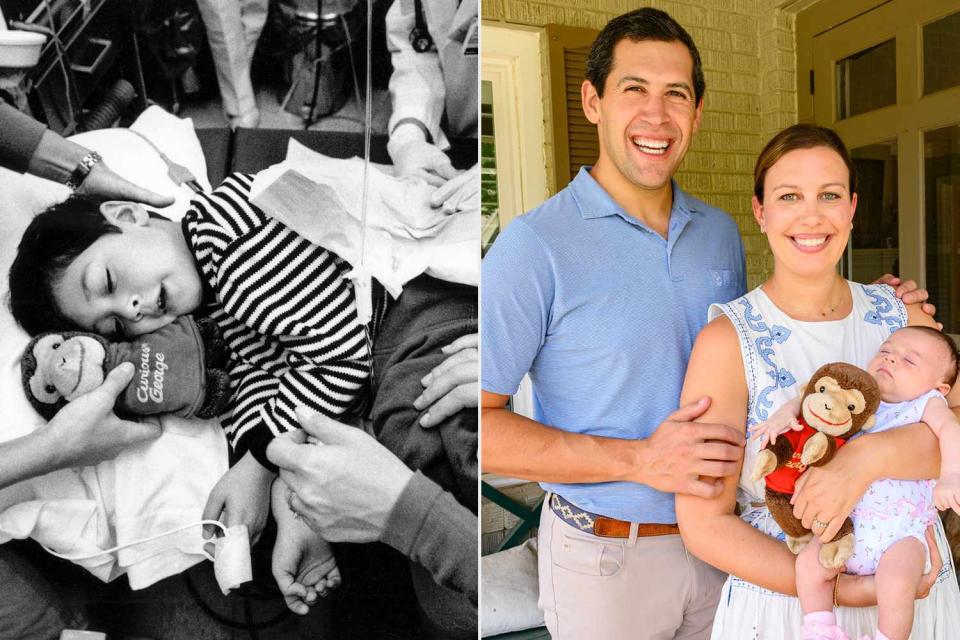
Courtesy of Harry Connolly
Eli Kahn at the hospital (left); Eli Kahn with wife Jayme and daughter Nora (right)Photographer Harry Connolly was in search of a new project back in 1993 when he saw a photo of a young boy in a magazine, which illustrated a father’s story of his son's futile fight against cancer. Since Connolly's mom had died of cancer when he was just 18, he decided right then and there to take on telling the stories of young cancer patients.
At Johns Hopkins Hospital in Baltimore, he met three young people from various backgrounds: Eli Kahn, then 2, Heather Brogdon, 9, and Keith Patrick, 16. The families agreed to have their photos taken over three years.
The result was “Fighting Chance: Journey Through Childhood Cancer,” published in 1998 with a foreword by the late author Tom Clancy.
“Years later, Eli’s mother said, 'Your photographs helped me understand what we were going through,' ” Connolly, now 72, tells PEOPLE.
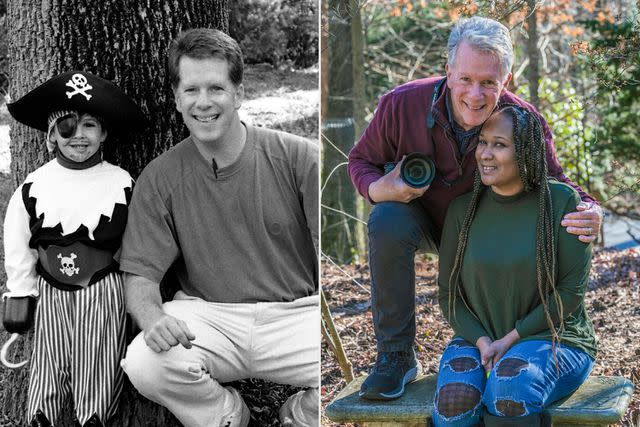
Courtesy of Harry Connolly, Alan Gilbert
Harry Connolly with Eli Kahn (left); Harry Connolly with Heather Brogdan (right)Harry stayed in touch with the kids and their families as they grew up and last year, on the anniversary of first photographing their journey, he asked them to allow him to update their photos to see how far they had come since those trying times.
“I think time tells a story,” Connolly summarizes.
And this is the story he wants to tell.
"I don't want pity"
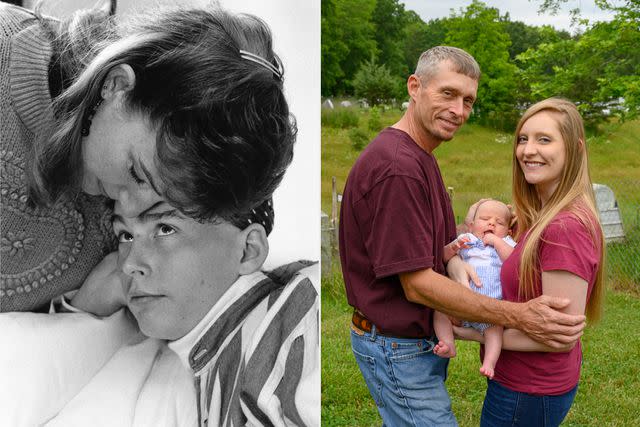
Courtesy of Harry Connolly
Keith Patrick with mom Dawn (left); Keith Patrick with wife Meggin and son Noah (right)Keith Patrick has never seen Harry’s book and very few of the photographs
“I was there. I didn’t want to relive it. It was hard enough,” Patrick, 46, the son of Maryland farmers, tells PEOPLE. “We were stuck in a time that has evolved.”
He only agreed to do the book because of his mom Dawn.
“I saw in my mom’s eyes the uncertainty that you saw on every other parent there," Patrick reflects. "It was a chance to maybe give them something to lean on.”
Never miss a story — sign up for PEOPLE's free daily newsletter to stay up-to-date on the best of what PEOPLE has to offer, from celebrity news to compelling human interest stories.
Patrick, who was 16 at the time, notes that treatments for T-cell lymphoma were excruciating, explaining, “You can’t look at a picture and understand that kind of pain and misery. You can’t prepare an adult for that, let alone a child.”
But he’s now in a good place with his wife Meggin and their son Noah, who turns 1 this month.
“I don’t want pity, I don’t want to be seen as just a cancer kid,” says Patrick, who at first resisted treatment because of the financial burden on his parents. “We went through cancer, yet there’s life at the end. And maybe it takes a while to get there, but in the end, there’s probably something worth living for.”
Related: These Families Enjoyed a Week-Long 'Break from Cancer' at Lakeside Resort: See the Touching Photos
"I am standing in my purpose”
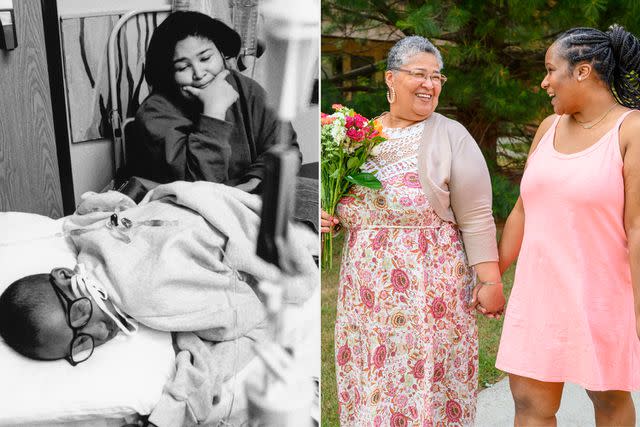
Courtesy of Harry Connolly
Heather Brogdon receiving treatment while mom Phyllis Vines watches (left); Phyllis Vines with Heather Brogdan (right)Survival. That’s what Heather Brogdon sees when she looks at the photos taken when she was freshly diagnosed with leukemia at 9.
“It reminds me of what I went through. I have survivor's remorse sometimes, because I made it but a lot didn’t,” Brogdon, 39, tells PEOPLE. “It dampens the spirit a little.”
Brogdon says she was angry during those years, about not being able to be at home, not going to school and not being around friends and “doing normal things.”
“Looking back now as a mom, I can’t even imagine what my mom was going through,” she says.
Now, “I don’t think I would be here without my family. My mom, my sisters, even my classmates were there to support me. To say it is OK not to be OK, that you can have your moments when you just break down,” Brogdon explains.
When her son Keith, 13, turned 9, she said she felt like she couldn’t breathe as the memories came flooding back.
She recognizes now that she spent a lot of her life wondering what is her purpose in life.
“I realize I am standing in my purpose,” Brogdon adds. “I’m a normal 9-to-5 working woman on the grind trying to take care of my son, just trying to better myself for him. I’m a typical woman.”
"I have a new-found appreciation of what my parents went through”
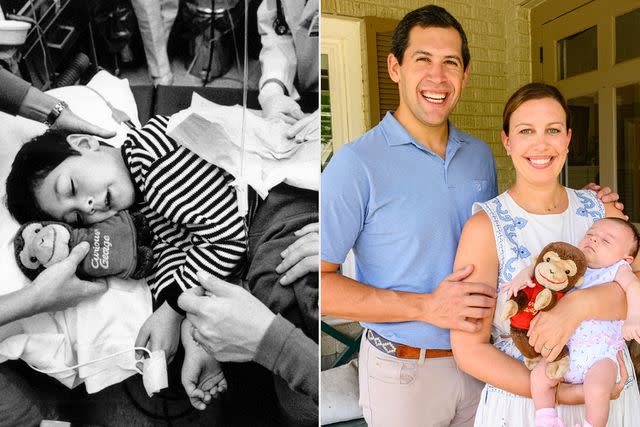
Courtesy of Harry Connolly
Eli Kahn at the hospital (left); Eli Kahn with wife Jayme and daughter Nora (right)Eli Kahn was just 2 when he was photographed getting treatment for his acute leukemia, so he says he has very few memories of the experience.
“Looking at the photos, you get an understanding of how difficult it must have been for my parents and my older sister,” Kahn, 33, and is married to wife Jayme, and parent to daughter Nora, who turns 1 in May, tells PEOPLE. “Now that we have a daughter, I have a new-found appreciation of what my parents went through.”
What he does recall during his three-year battle is being surrounded by the love and positivity of his parents, which he calls “invaluable.”
“As soon as treatment was done, they saw me as Eli, the normal kid,” Kahn remembers. “My parents ingrained in me and my sister that things like this happen, but you just take the cards you were dealt and live life as normal as possible.”
His parents also instilled a sense of gratitude. As a teen, he did a huge fundraiser for Johns Hopkins. These days, he volunteers as a board member for Junior Achievement.
“I think an experience like this should not define who you are, but can drive a lot of good,” Kahn explains. “Whether you saw it as a positive or a negative at the time, I think in hindsight you’re on the other end. Use that for good.”
For more People news, make sure to sign up for our newsletter!
Read the original article on People.

